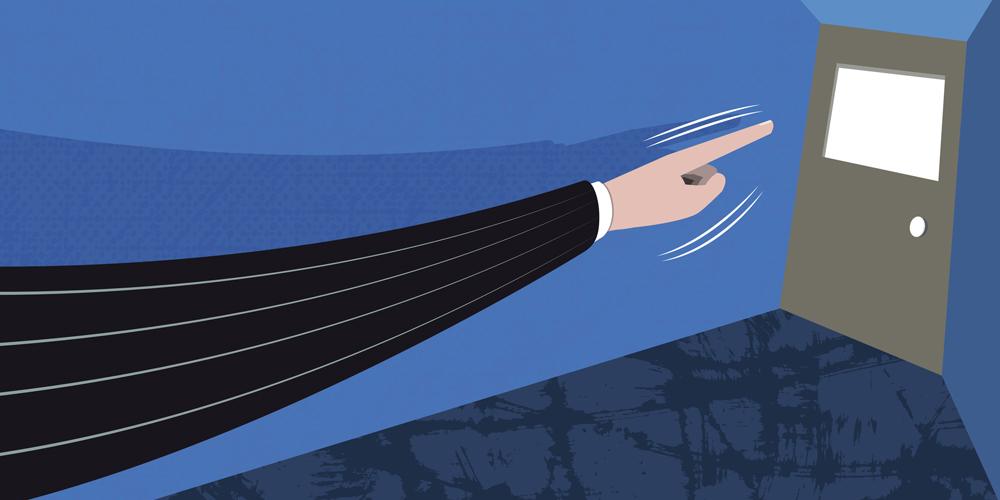Is it time to fire yourself?
Anyone can get stuck in a rut and become too invested in the initiatives they’ve launched. Use this mental trick to keep a fresh perspective.
No, that headline is not meant to suggest that this is another story about the “great resignation.” Rather, the question can be a useful provocation to help everyone step back from their job and see it with fresh eyes. If you were your boss, what would be your clear-eyed assessment of the work you’ve been doing? Being able to assess your own work accurately is particularly important in this era of relentless disruption, given that simply maintaining the status quo is a surefire strategy for falling behind.
It’s neither easy nor comfortable to create some distance from the job you’ve been doing and to contemplate how you might do it differently. After all, as human beings, we crave a degree of certainty in our lives, particularly these days, when it feels like a dark cloud of dread hovers overhead. Another reason it’s hard is that we can become overly invested in the people we’ve hired and the initiatives or strategies we’ve launched. We naturally like to think we have good judgment, and therefore we look for clues that reinforce the smartness of our choices rather than constantly questioning them.
And so you need to, on occasion, entertain an unsettling question: is it time to fire yourself?
This idea was brought to life when I interviewed Bracken Darrell, the CEO of Logitech International, a computer peripherals manufacturer headquartered in Switzerland and the US. In that conversation, he shared with me the story of how, about five years into his tenure at the company, he asked himself one Sunday night, “Am I the right person for the next five years?”
On paper, he certainly was, he told me, given that all his changes at the company had lifted the stock about 500%. “On the other hand, I had been involved in every single personnel and strategic decision,” he said. “My disadvantage was that I knew too much, and that I was too embedded in everything we were doing. I just thought to myself that I might be done.” So he decided that night that he was going to fire himself, but he would sleep on the decision.
The punchline is that he didn’t fire himself, but he did wake up the next morning with a sense of clarity of what he needed to do: “I have to rehire myself but have no sacred cows. It was super exciting and fun, and I started changing things that I had put in place. Fortunately, I didn’t have to change things radically, but I felt new again.” The share price is now 11 times higher what it was when Darrell took over.
Rapid reincarnation
Darrell isn’t the only CEO who has contemplated kicking himself or herself out of the job they worked so hard to attain. Former Intel CEO Andy Grove wrote in his 1996 book, Only the Paranoid Survive, about the time when the company’s memory-chip business was getting clobbered by Japanese competitors in the 1980s. Grove asked Gordon Moore, Intel’s cofounder, “If we got kicked out and the board brought in a new CEO, what would he do?” (Perhaps it was a sign of the times that Grove assumed the new CEO would be male.)
Moore responded by saying that a new CEO would take Intel out of the memory-chip business. “Why shouldn’t you and I walk out the door, come back and do it ourselves?” Grove responded. And that’s what they did. They shifted Intel from memory chips to microprocessors, a crucial pivot that led to decades of prosperity for the company.
Although it’s easy to dismiss the question of whether you should fire yourself as being flippant and impractical, consider that it is part of the essential leadership skill of scenario planning. The business world was relatively stable for almost a dozen years before COVID hit, and so boards of directors and C-suite leadership teams were able to narrow the various what-if scenarios they had to contemplate during risk-management meetings. Understandably, not many companies were studying questions such as, what if everybody had to start working at home? Or, what would it mean to stop operating in Russia?
Although it’s easy to dismiss the question of whether you should fire yourself as being flippant and impractical, consider that it is part of the essential leadership skill of scenario planning.
But we are now fully living in the VUCA era, a well-known acronym coined by the US Army War College that stands for volatility, uncertainty, complexity, and ambiguity. And so, what’s next? Cyberattacks? A new flashpoint in the climate crisis? Another deadly virus?
John Donovan, the former CEO of AT&T Communications who sits on many boards, told me that a key part of scenario planning is having the discipline to distance yourself from the job you’ve been doing and to imagine it through the eyes of a newcomer.
“You basically have to fire yourself and all your people every year mentally, and then rehire them for what’s required for the next set of challenges,” he said in our interview. “Too often companies stagnate. Most of the time, it’s because something changed, and the playbook that got them there is not the playbook that’s necessary to go forward.”
If the prospect of firing yourself seems too hard to contemplate, there’s another way to get to the same result. If you have a competitive personality—and it’s a good bet that you do if you are in a senior role—then just think about the person who is going to follow you in your job. What steps might they take, because they are not invested in everything you’ve done, that would make you think, why didn’t I do that?





